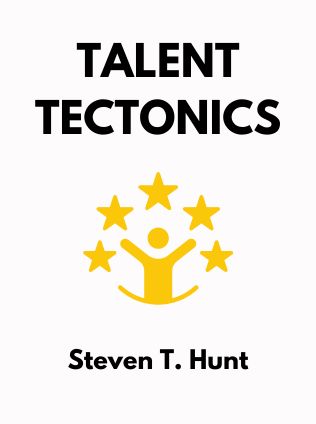
Talent Tectonics
Navigating Global Workforce Shifts, Building Resilient Organizations and Reimagining the Employee Experience
By Steven T. Hunt
Published 09/2022
About the Author
Steven T. Hunt is a renowned expert in the field of organizational psychology and human resource management. With over two decades of experience, Hunt has dedicated his career to understanding the intricacies of workforce dynamics and the impact of technological advancements on employee experience. His work is characterized by a deep integration of business strategy, psychology, and technology, aimed at creating resilient organizations capable of navigating the rapidly shifting landscape of the modern workforce. Hunt's insights are grounded in both extensive research and practical application, making his contributions invaluable to leaders seeking to build adaptable and thriving organizations.
Main Idea
Talent Tectonics: Navigating Global Workforce Shifts, Building Resilient Organizations and Reimagining the Employee Experience by Steven T. Hunt explores the profound changes reshaping the nature of work and workforces. The book delves into the twin forces of digitalization and demographics, examining how they are transforming job roles, organizational structures, and employee experiences. Hunt argues that by leveraging insights from psychology and advancements in technology, organizations can create more nimble and resilient work environments. This transformation involves not only rethinking traditional business practices but also fostering a culture that values adaptability, learning, and meaningful employee engagement.
Table of Contents
- Forces Reshaping Work and Workforces
- The Employee Experience and Workforce Adaptability
- Work Technology and Organizational Agility
- Designing Organizations to Provide Positive Employee Experiences
- Developing Capabilities and the Employee Experience of Learning
- Creating Engagement and Employee Experiences that Inspire Successful Performance
Forces Reshaping Work and Workforces
The concept of "talent tectonics" likens the shifts in work and organizations to the movement of tectonic plates reshaping the earth. The most significant forces at play are digitalization and changing demographics. Digitalization is redefining job roles and skills requirements, while demographic shifts are altering the composition of the workforce. Companies must adapt to these changes by rethinking how they manage employees and design job roles.
"The shift to remote work in 2020 was akin to an earthquake, triggered by the pandemic but enabled by decades of technological advancement." - Steven T. Hunt
This analogy highlights how underlying technological progress set the stage for the sudden and permanent shift to remote work, driven by the pandemic. Organizations must now consider employees' needs and preferences alongside their operational requirements to remain competitive in the global labor market.
Digitalization and demographics are not just external forces but internal catalysts for change. As technology evolves, so do the skills required for various job roles. Similarly, as demographics shift, the workforce becomes more diverse, bringing in different perspectives and expectations. This dual force requires companies to be agile and forward-thinking in their approach to workforce management.
Organizations must also challenge long-standing assumptions about education, work, unemployment, and retirement. The traditional model of working for a single company for decades is fading. Instead, there is a growing trend towards continuous learning and career mobility. Companies that embrace these changes and support their employees in lifelong learning and development will be better positioned to succeed in the future.
The Employee Experience and Workforce Adaptability
People are the constant in any organization, and their adaptability is key to organizational success. The book emphasizes creating employee experiences that unlock their innate ability to adapt. This involves understanding the psychological factors that influence how people respond to change. Hunt dispels the myth that people fear change; instead, they fear poorly managed change.
"Managing for adaptability requires understanding the psychological factors that influence how people respond to change." - Steven T. Hunt
By fostering a sense of achievement and confidence among employees, companies can encourage a growth mindset. This mindset enables employees to view change as an opportunity for growth and development. Providing meaningful work and supportive relationships further enhances their adaptability.
A sense of achievement is crucial for maintaining motivation and resilience in the face of challenges. When employees see their work as meaningful and connected to their personal goals, they are more likely to persist and thrive. This sense of achievement is fostered by giving employees ownership over tasks and recognizing their contributions.
Confidence is equally important. Employees need to believe in their ability to succeed and feel supported by their peers and leaders. This confidence is built through continuous feedback, opportunities for skill development, and a culture of collaboration. When employees feel confident and supported, they are more likely to embrace change and take on new challenges.
Sign up for FREE and get access to 1,400+ books summaries.
You May Also Like
The Subtle Art of Not Giving a F*ck
A Counterintuitive Approach to Living a Good Life
By Mark MansonRich Dad Poor Dad
What the Rich Teach Their Kids About Money - That the Poor and Middle Class Do Not!
By Robert T. KiyosakiHow To Win Friends and Influence People
The All-Time Classic Manual Of People Skills
By Dale CarnegieQuiet: The Power of Introverts
The Power of Introverts in a World That Can't Stop Talking
By Susan Cain



















